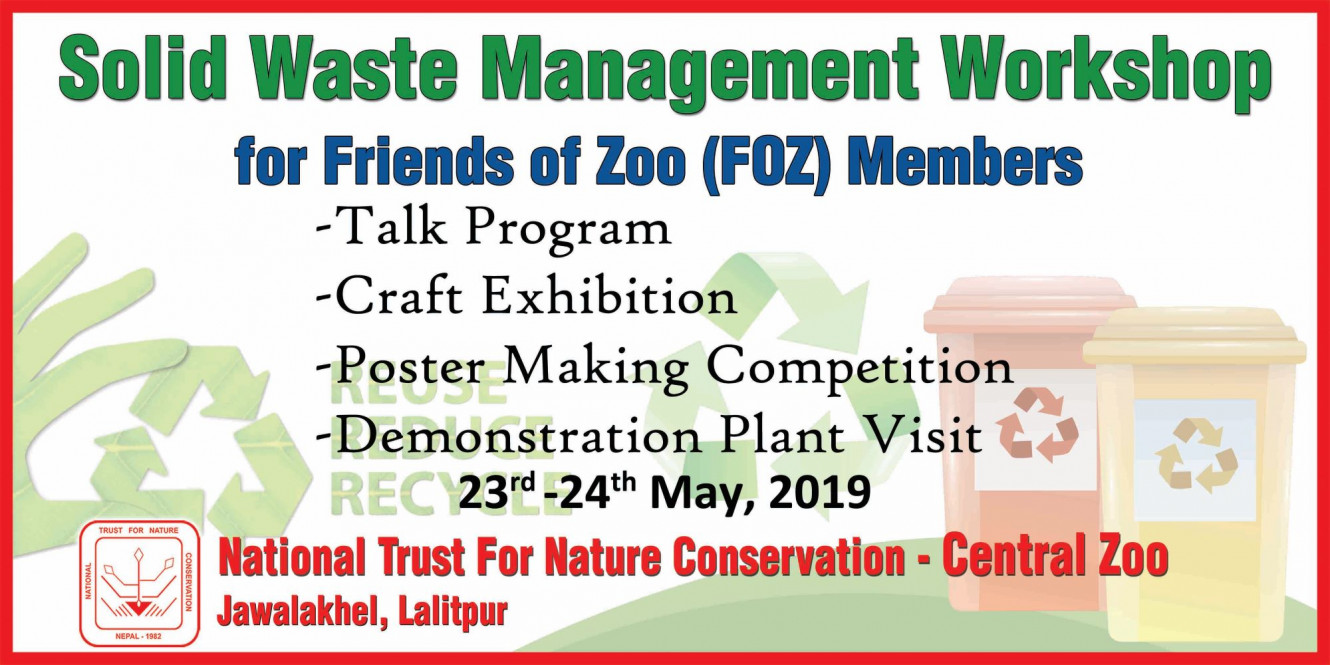
The past two days at the Central Zoo (May 23 & 24) were dedicated to raising youth awareness and demonstrating simple actionable solutions that can be used in in our day-to-day lives which can have tremendous implications on combatting the alarming impact of waste on the environment. For Kathmandu Valley that is marked with increasing population and consumer activity, developing youth awareness into responsible action will be quintessential for improving on the current pollution standards and the quality of life.
NTNC-Central Zoo teamed up with Kahli Sisi and Nepsemyak Sewa—two prominent organizations working to tackle urban waste in Kathmandu—to conduct waste management-related workshops and interaction programmes advocating about the environmental as well economic benefits from conscious and easy-to-do waste management practices. Simultaneously we conducted craft exhibitions to communicate about the potential of product- and industry-related skills using waste creativity, along with organizing poster making competitions and conducting onsite demonstrations reaching out to more than 300 FOZ (Friends of Zoo) students from 33 schools, these besides participating zoo visitors.
The Central Zoo receives more than one million visitors annually. Given this tremendous volume, since 2009, we have implemented a ban on the use of plastic bags inside the zoo premises, adopting the 3R principle of reduce, reuse and recycle. Alternatively cloth and paper bags are provided so as to ensure a clean and green zoo experience for visitors. Inside the zoo premises, a compost plant is also used where organic waste like food, animal and other biodegradable wastes to the tune of about 3-4 metric tons (equivalent to 1 metric ton of compost) is collected daily to be reused as fertilizers or recycled.
Keeping with the success of the 3R principle, today we have implemented a similar model among our Friends of Zoo (FOZ) members. Out of our current network of more than 150 FOZ schools, already 49 FOZ schools in Kathmandu, Lalitpur and Bhaktapur have successfully stopped using plastic bags inside their school premises. This besides, we help to continuously engage inter-school collaboration among student groups for initiating waste management alternative actions through mentorship and cross learning, creative activism and exposure visits. For example, during the present event students were also taken to Kathmandu Metropolitan Waste Centre to learn and explore how waste is being presently managed.
The focus of the two-day campaign, themed as 'beat the waste' is linked to this year's World Environment Day (June 05) theme that looks to tackle the growing crisis of air pollution globally. It aims to keep the mass public informed about steps that are being taken at the smallest level to make a difference. NTNC strongly believes that when it comes to taking on waste management in Nepal, youths will be key in moving innovation, leadership and collective responsibility in the future towards a cleaner and healthier environment.
See photos:
